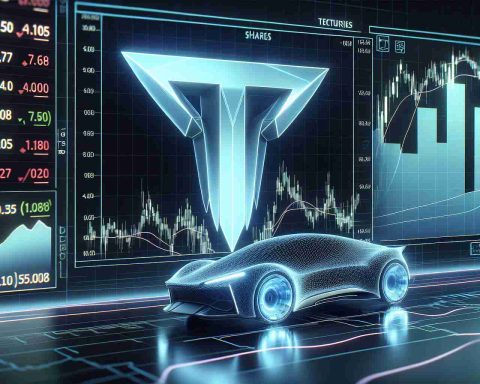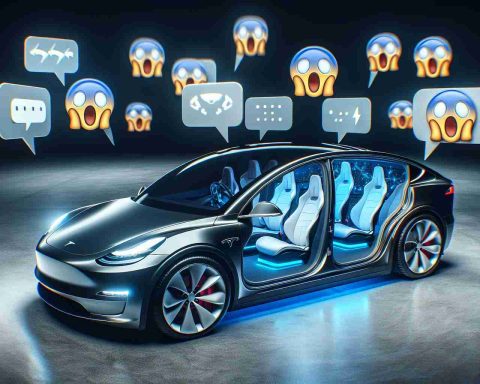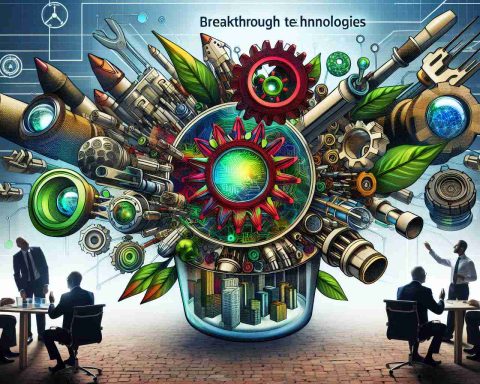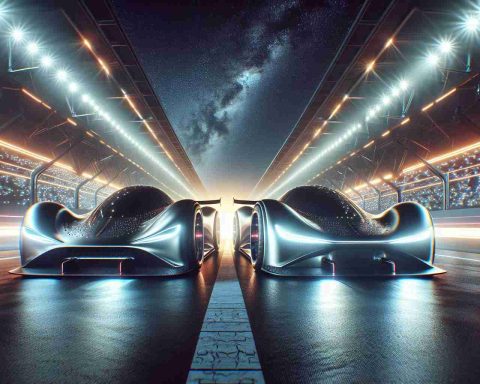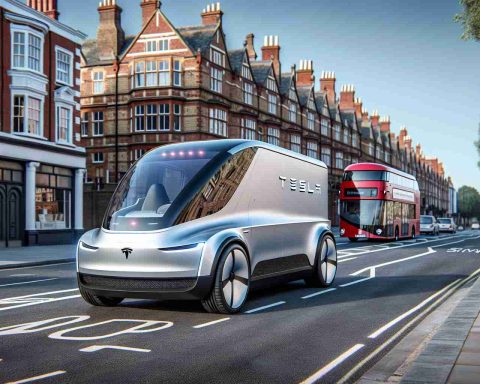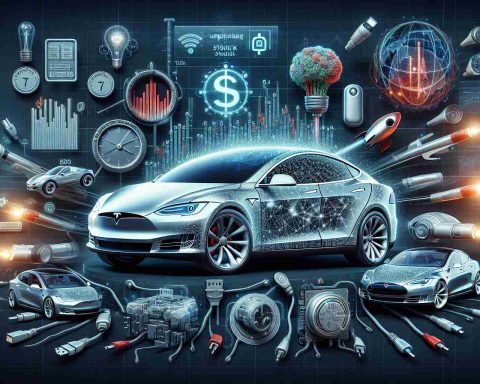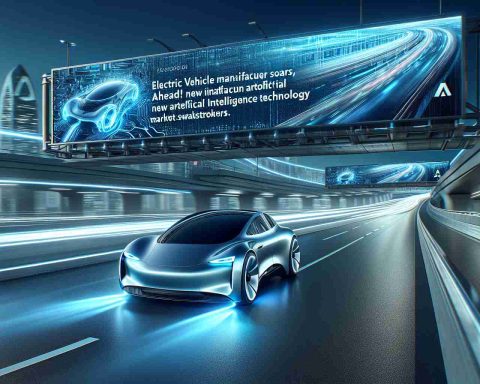A Groundbreaking Partnership for Eco-Friendly Vehicles
In an exciting turn for sustainable transportation, LG Energy Solution has teamed up with Aptera Motors to provide cutting-edge solar electric vehicle (EV) batteries. This collaboration was formalized at the CES 2025 event, where LG, Aptera, and CTNS signed an impactful Memorandum of Understanding aimed at enhancing battery supply and business development.
The Battery Supply Agreement establishes LG Energy Solution’s commitment to delivering 4.4 GWh of 2170 cylindrical battery cells over the next few years. These batteries will be integral to powering Aptera’s innovative solar EVs, with the first models anticipated to hit the U.S. market by 2025.
Manufacturing and Production efforts will involve CTNS creating battery modules and packs, which Aptera will use in its solar vehicles. The design of Aptera’s EVs is particularly striking, boasting minimized air resistance that significantly enhances energy efficiency. With a remarkable range of 643 km (400 miles) per charge, the vehicle’s integrated solar panels alone contribute up to 64 km (40 miles) of daily driving.
Advanced Battery Features highlight the safety and reliability of LG’s cylindrical batteries, which are designed with durable NCMA cathodes and reinforced safety components. Mass production at LG’s Arizona facility is set to begin in 2026, solidifying their position in the market.
This partnership is a significant step towards a future where sustainable, solar-powered transportation becomes a reality.
A Transformative Shift Towards Sustainable Mobility
The partnership between LG Energy Solution and Aptera Motors represents more than just a technological advancement; it signals a potential paradigm shift in how we conceive of transportation. With pressing climate concerns and an urgent need to reduce carbon emissions, such collaborations indicate a robust response from the automotive sector. The integration of solar energy with electric vehicle technology illustrates a profound understanding of eco-conscious consumer demands and environmental urgencies.
The implications of this breakthrough extend beyond individual vehicle performance. As solar electric vehicles (EVs) gain traction, there could be substantial benefits for society and the global economy. A sustained focus on EV infrastructure will likely stimulate job creation, not just in manufacturing but also in sectors supporting renewable energy. The growing market for sustainable vehicles could lead to shifts in consumer behavior, making eco-friendly choices more mainstream.
Looking toward the future, the environmental ramifications are particularly noteworthy. If solar EVs become widespread, urban air quality may improve significantly, reducing health risks associated with traditional transportation. Furthermore, by decreasing dependence on fossil fuels, the partnership’s advancements could contribute to global energy security.
In essence, the LG-Aptera collaboration could pave the way for more innovative partnerships in the sector, ultimately leading to a cleaner, more sustainable future. As cities around the world adapt to an evolving transportation landscape, the focus on renewable resources will likely become a cornerstone of urban planning and policy, ensuring resilience against climate change while fostering economic growth.
Revolutionizing the Future of Transport: LG Energy Solution and Aptera Motors Join Forces
A Groundbreaking Partnership for Eco-Friendly Vehicles
In a transformative initiative for sustainable transportation, LG Energy Solution has forged a partnership with Aptera Motors to develop state-of-the-art solar electric vehicle (EV) batteries. This strategic collaboration was announced during the CES 2025 event, where LG, Aptera, and CTNS signed a significant Memorandum of Understanding aimed at boosting battery supply and advancing business development in the eco-friendly transport sector.
# The Battery Supply Agreement
Under the newly established Battery Supply Agreement, LG Energy Solution is set to provide 4.4 GWh of 2170 cylindrical battery cells over the coming years. These cells will serve as a critical component in Aptera’s groundbreaking solar EVs, with the initial models expected to enter the U.S. market by 2025. This commitment underscores LG’s role as a key supplier in the growing electric vehicle industry.
# Manufacturing and Production Insights
The production structure will see CTNS play a pivotal role in developing battery modules and packs, which Aptera will utilize in its unique solar vehicles. The aerodynamic design of Aptera’s EVs significantly minimizes air resistance, thereby amplifying energy efficiency. Notably, these vehicles boast an impressive range of 643 km (400 miles) on a single charge, with integrated solar panels capable of providing up to 64 km (40 miles) of daily driving power. This innovation places Aptera at the forefront of eco-friendly vehicle technology.
# Advanced Battery Features
The cutting-edge features of LG’s cylindrical batteries are engineered for enhanced safety and reliability. The new batteries incorporate durable NCMA (Nickel, Cobalt, Manganese, and Aluminum) cathodes along with advanced safety components designed to resist damage and enhance performance. Mass production is slated to launch at LG’s Arizona facility in 2026, solidifying the company’s competitive edge in the battery manufacturing landscape.
# Market Implications and Sustainability Trends
This collaboration is more than just a business agreement; it represents a significant leap towards a future dominated by sustainable, solar-powered vehicles. Given the global push towards renewable energy sources and eco-conscious consumer behavior, Aptera’s solar EVs are well-poised to capture a growing market of environmentally aware consumers.
As consumer demand for electric vehicles continues to rise, partnerships like that of LG Energy Solution and Aptera Motors highlight essential innovations that not only aim to reduce carbon footprints but also increase the accessibility of clean transportation options.
# Pros and Cons of the Partnership
Pros:
– Sustainability Focus: The partnership centers on the creation of eco-friendly vehicles that utilize renewable energy.
– Innovation: Both companies are pushing the boundaries of battery technology and vehicle design.
– Market Readiness: The roadmap for production and delivery is set, with models expected to hit the market by 2025.
Cons:
– Production Timeline: While promising, the actual mass production of the batteries won’t commence until 2026.
– Market Competition: Aptera will face competition from established EV manufacturers, impacting market penetration.
# Predictions and Future Outlook
As the automotive industry shifts more towards sustainable options, it is predicted that partnerships highlighting solar technology and advanced battery systems will become increasingly common. Consumers can expect to see more innovations that integrate green technology, ultimately contributing to reduced emissions and a healthier planet.
For more information on the latest developments in electric vehicle technologies, visit Aptera Motors and LG Energy Solution.








